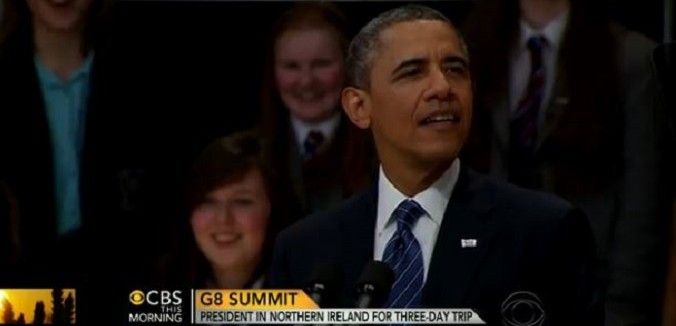A G8 meeting today between President Obama and Russian President Vladimir Putin regarding the Syrian conflict ended without apparent progress. Reuters conveys the mood awkward:
Both leaders looked tense and uncomfortable as they addressed reporters after about two hours of talks, with Putin staring mostly at the floor as he spoke about Syria and Obama only glancing occasionally at the Russian leader.
“Our positions do not fully coincide, but we are united by the common intention to end the violence, to stop the number of victims increasing in Syria, to resolve the problems by peaceful means, including the Geneva talks,” Putin said… Obama tried to lighten the mood at the end of their talks by discussing judo but Putin, a black belt in the martial art, replied that the then-smiling U.S. president was simply trying to get him to relax.
The Syrian conflict is “likely to weigh heavily” throughout Obama’s three-day European trip. which today will include participation in a G8 summit.
The weekend saw still more worrying signs that the now two-year old conflict was spiraling into a regional Sunni-Shiite war.
On the Shiite side, pro-Iranian sources seem to have leaked to a British outlet that Tehran is preparing to pour 4,000 troops into Syria on behalf of the Bashar al-Assad regime. Hezbollah worked with the Syrian army to prepare for an offensive against the rebel stronghold of Aleppo:
Some 80 thousand military forces trained by Lebanese Hezbollah were preparing to launch a ground offensive to recapture Syria’s commercial city of Aleppo. According to a report in the UK-based Sunday Times, a Hezbollah commander said the fighters belonging to Syria’s National Defense Force (NDF) have been taught “to fight street by street.” The fighters were also trained by Iran’s Revolutionary Guards, the newspaper added.
On the Sunni side, German media reported that Saudi Arabia is moving toward arming the rebels with anti-aircraft weapons. In Egypt the Muslim Brotherhood-led government formally severed diplomatic ties with Damascus. Brotherhood figures also lashed out against Hezbollah, with one of the group’s spokesman contextualizing the war in sweeping, sectarian terms:
In a striking display of the religious enmity sweeping the region since Lebanon’s Iran-backed Hezbollah committed its forces behind Syrian President Bashar al-Assad, a Brotherhood spokesman in Cairo told Reuters on Friday: “Throughout history, Sunnis have never been involved in starting a sectarian war.”… But spokesman Ahmed Aref said Hezbollah had launched a new “sectarian war” last month by joining Tehran’s other key ally Assad in a fight that pits mainly Sunni rebels against a Syrian elite drawn from Assad’s Alawite minority, a Shi’ite offshoot.
In the Gaza Strip, Hamas criticized Hezbollah for worsening sectarian violence and called on the Iran-backed Shiite terror group to instead target Israel. The spectacle of a Sunni Iran-backed terror group criticizing a Shiite Iran-backed terror group underscored how deeply sectarian divisions have taken hold throughout the region.
[Photo: cbsnews.com]




